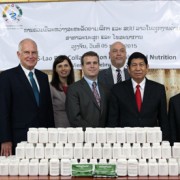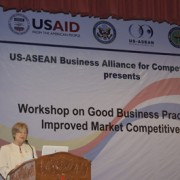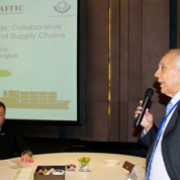Thailand graduated from USAID assistance in 1995 and USAID closed its bilateral mission the following year. In 2003, USAID returned to Bangkok to open a regional mission serving Asia. More than a decade later, USAID now works on cross-border issues of concern to Thailand and the region and draws upon Thai expertise to support development results in other countries.
The bulk of U.S. development assistance to Thailand is through regional programs that primarily cover the Southeast Asia region, including support to the Association of Southeast Asian Nations (ASEAN), the Asia-Pacific Economic Cooperation (APEC) group, and other regional fora of which Thailand is a member. These efforts are leading to greater regional economic integration and cooperation on issues of mutual interest to the United States and Thailand.
OUR WORK
While Thailand has become an upper middle-income country, it is not immune to regional and global development challenges. These include trafficking in persons for forced prostitution and labor, the relatively high prevalence of HIV and AIDS in specific populations, and the effects of global climate change — a threat that elevates the danger of natural and man-made disasters, droughts, extreme weather patterns and rising sea levels, putting lives and hard-earned economic growth at risk. USAID’s regional programs help prevent human and wildlife trafficking, reduce the incidence of HIV and AIDS and other diseases, and promote the responsible use of natural resources.
HUMAN RIGHTS AND GOVERNANCE
USAID works to protect and empower vulnerable populations, such as those targeted for human trafficking and lesbian, gay, bisexual and transgender (LGBT) communities. According to the U.S. Department of State’s 2014 Trafficking in Persons report, Thailand is a source, transit and destination country for trafficking victims for commercial sexual exploitation and forced labor. A USAID-funded awareness raising campaign — which disseminated information at high profile concerts, during television programs and through social media on how to help young teenagers and adults protect themselves from human traffickers — has reached at least 137 million people throughout Asia. USAID also addresses challenges facing Asia’s LGBT community, which is especially vulnerable to violence, social stigma and discrimination in many walks of life. USAID manages a regional initiative that works with universities, human rights organizations and LGBT associations to increase their ability to address these challenges. Other USAID projects assist citizens in becoming more engaged in governance. With USAID support, Khon Kaen University created a Center for Civil Society and Non-Profit Management to enhance civil society practitioners’ management skills through focused degree courses and certificate training programs. Students also study how successful non-government and civil society leaders can mobilize constituents and policymakers to encourage effective regional development and advocacy.
GLOBAL HEALTH
USAID’s regional health programs in Thailand and neighboring countries address HIV and AIDS, malaria, tuberculosis (TB) and avian influenza. In 2013, USAID programs reached more than 13,000 people in Thailand alone, providing HIV prevention education, condoms, counseling, and testing and treatment for sexually-transmitted infections. Teaming up with universities in Indonesia, Malaysia, Thailand and Vietnam under the Southeast Asia “One Health University Network,” USAID helps detect and contain emerging infectious diseases before they become public health threats. The satellite Thailand One Health University Network program (with Chiang Mai, Chulalongkorn, Kasetsart, Khon Kaen, Mahidol and Prince of Songkla universities) has hosted regional training for students and faculty. Other potential global health threats being addressed include TB and multidrug-resistant TB, especially among mobile and migrant populations across the region. In addition, USAID leads the President’s Malaria Initiative and partners with the U.S. Centers for Disease Control and Prevention to conduct research, monitor malaria control efforts, and carry out prevention activities. As part of these efforts, the governments of Burma, Thailand and the United States have launched their first cooperative effort to reduce drug-resistant malaria along the Thai-Burma border.
ENVIRONMENT
USAID takes advantage of Thailand’s technical expertise to strengthen regional efforts that promote green growth, low emission development and sustainable infrastructure, improve accounting of greenhouse gas inventories, increase community-level climate change adaptation capacity and resilience, and protect forests and conserve biodiversity across Asia. Thailand is a member of the USAID-supported ASEAN Wildlife Enforcement Network, which trains law enforcement personnel and increases public understanding of the negative impacts of illegal wildlife trafficking, including education on actions that can be taken to stop it. New public-private partnerships work with luxury hotel chains and local governments to reduce the consumption of shark fin and stop the sale of shark products to protect a predator critical to the conservation of marine ecosystems.
Laos’ growing importance on the world stage is a reflection of its 2013 accession to the World Trade Organization (WTO), its membership in the Association of Southeast Asian Nations (ASEAN), its shared borders with China, Burma, Cambodia, Vietnam and Thailand, and its unique position on the Mekong River, the lifeblood of mainland Southeast Asia. As Laos enters international markets, the United States is helping to improve the country’s economic policies and increase its integration within the global economy.
USAID helps Laos modernize its economy while promoting sustainable development and biodiversity conservation. As trade opens Laos’ borders to increased goods and investment partners, USAID also works to reduce the incidence of infectious diseases and pandemic threats.

The United States today announced plans to launch activities in the Lao People’s Democratic Republic (Lao PDR) to help reduce malnutrition rates and growth stunting in vulnerable communities through nutritional supplements, improved methods of feeding infants and young children, and better community sanitation.

More than 125 small and medium-sized enterprise (SME) entrepreneurs attended a one-day workshop in Phnom Penh today to enhance their knowledge and skills on good business practices presented by U.S. multi-national companies.

Representatives from across the transportation and logistics sector today joined customs officials, supply chain experts and wildlife professionals for the start of a two-day consultative workshop to find actionable solutions to deter wildlife smuggling activities while strengthening supply chains and corporate policies.







Comment
Make a general inquiry or suggest an improvement.